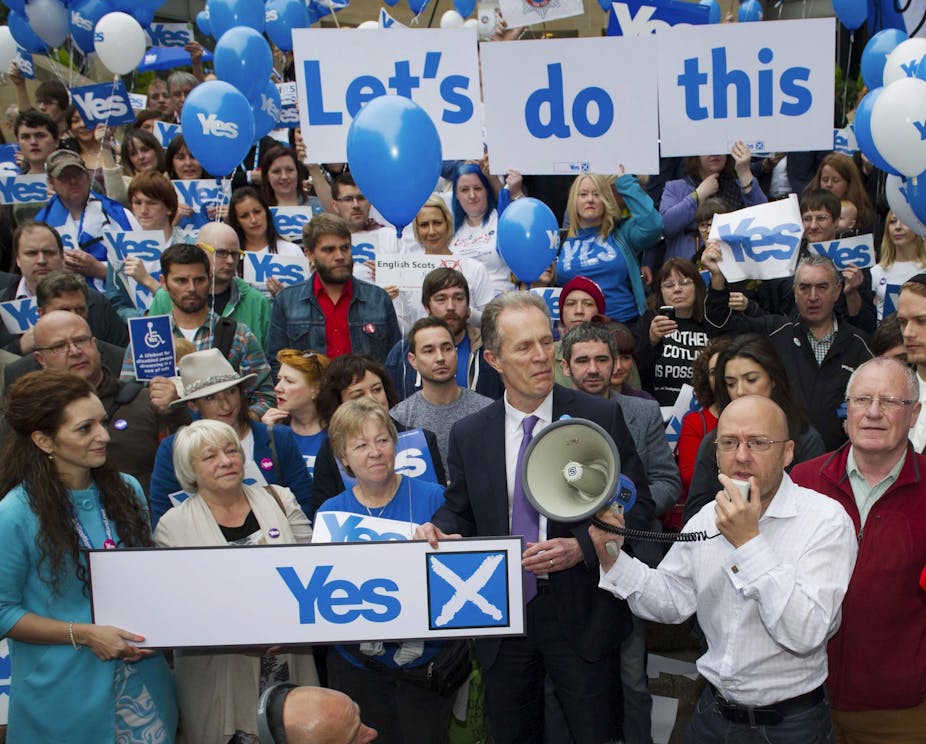On Friday morning, I, an expatriate “British Scot”, could wake up to find that I have lost my identity. Because today Scottish voters might decide that a United Kingdom that includes Scotland ought no longer to exist.
It will all depend on the answer to a deceptively simple question: should Scotland become an independent country? As usual, everyone seems to have strong views.
The “Yes” campaign, led by the pugnacious Scottish First Minister, Alex Salmond, and his deputy, Nicola Sturgeon (yes!), has emphasised the enormous benefits of renewed Scottish nationhood. Scotland will have a seat at the United Nations, recognition as a sovereign by other states, an independent fiscal and defence policy, the right to send teams to the Olympics, and access to North Sea oil and the economic boon that this might provide.
The “No” campaign, with its slightly downbeat slogan, “Better Together”, has spent a fair bit of energy warning voters that independence could lead to disaster on many fronts. This includes exile from Europe, an exodus of the great Scottish banks to London, border controls between England and Scotland, the destruction of the United Kingdom and an Iceland-style financial crash.
Even Australian Prime Minister Tony Abbott weighed in on the side of the “No” campaign by saying that an independent Scotland would delight “enemies of freedom and justice”.
These are all important matters but it is highly likely that the nationalists have overstated the benefits of independence just as the misery predicted by the “No” campaign is unlikely to occur.
So when people ask me how I would vote (if I had a vote), I answer in uncertain terms: “an agonising no”, as I recently told a radio interviewer.
Being anti-English is not enough
Being Scottish is a complicated business. I was brought up, after all, to be suspicious of the English. I remember being taken as an eight-year-old to the battlefield at Culloden near Inverness in the heart of the Highlands.
This is where the Jacobite rising of 1745 ended in catastrophe for the Highland clans. It is perhaps the key historical moment in the construction of a modern Scottish national identity.
Here a certain form of Scottish political nationalism based around the clan system was extinguished. At the same time, a later cultural nationalism arising out of exactly the same clan system was established and, indeed, became and remained closely linked in the public mind with Scottish nationhood.
Inside the battlefield museum, at the doorway, was a large oblong painting of an English redcoat bayoneting a dying Scottish clansman (fully kilted and helplessly wielding a claymore). I stopped to look at the painting and a primitive form of nationalism was born in me. I took up – as an early hobby – “despising the English”.

What did this mean? Well, if England played Uruguay in a soccer match I would bone up on Uruguayan culture and politics, and become a fully committed Uruguayan for a few weeks.
Later, though, I became a fully anglicised Scot with many English friends and cultural and institutional affiliations. Now I experience Scottish anti-Englishness (a growing and deplorable tendency on the outskirts of Scottish cultural and political life) as a hugely immature provincialism.
And so, if I was resident in Scotland I would vote, with some regret, against independence. This is hardly Gaza and Israel, but I find it remarkable that so few people in the mass media and on blogs seem anguished by the moral and political issues at stake. As usual, everyone seems so certain.
Beware the seductive but suspect yearnings
Here I make a plea for what I will call melancholy nationalism, a political and cultural nationalism that both revels in and rebels against national sentiment. It is a nationalism that understands itself as a yearning for something that has never existed, a nationalism that allows itself to suspend that knowingness every so often in order to be moved by quixotic tribal gestures, a nationalism that feels the threat from global sameness, yet escapes regularly into cosmopolitan plural identity.
To be Scottish, then, is to feel at once a powerful attraction exerted by the symbols of crude Scottish nationalism, a nostalgia for a Scottish commitment to strongly redistributive democracy and proletarian protest, and a belief in the distinctiveness and distinctive contribution of Scottish cultural and intellectual elites in the world. But it is also to harbour serious doubts about each of these.
What will happen? I think the “No” vote will be stronger. The Scots are not averse to celebrating their victories but it is the defeats that matter.
This is true of Scottish contemporary identity: bound up, as it is, with the generally miserable, occasionally heroic performance, of the Scottish football team at the World Cup, for example.
Indeed, there is a self-mythologising streak of defeatism or defeat-obsession that might well result in an aftermath to the referendum today in which the Scots wake up to discover that they have voted against independence, and collectively mourn the fact.

